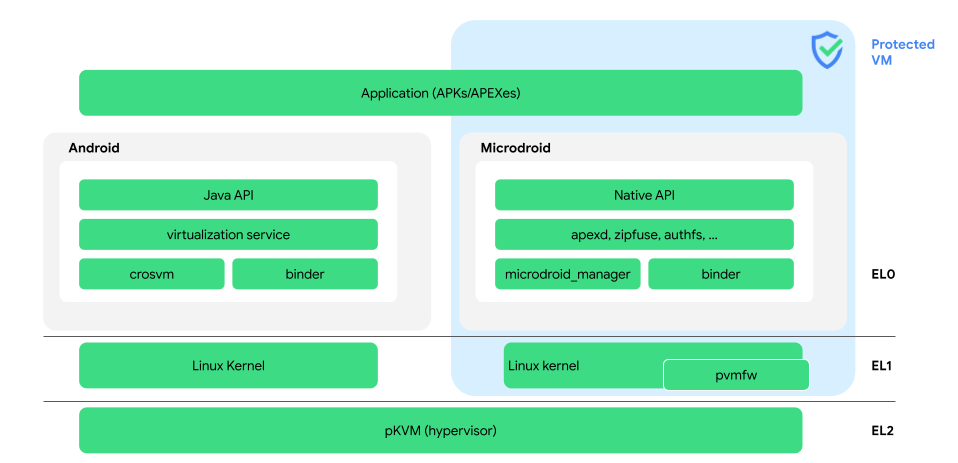- cross-posted to:
- [email protected]
- [email protected]
- cross-posted to:
- [email protected]
- [email protected]
My question is, will it be a real VM or a container? They are both Linux, so it could potentially work. Anyways, I really like the idea of my phone also being my laptop that I can just plug a keyboard into, and not some big screen phone apps with a semblance of desktop layout.
This graphic shows that the platform is designed with full virtualization in mind. You can see that the VM on the right has its own kernel (unlike for example docker containers).

Edit: image source
Am I the only one that smells DRM? Maybe this will become the new way Google can force stock Android with all of its spyware
I can’t believe they’re at all worried about Linux on phones yet, not with the state mobile Linux is in at the moment. It’s improving, but UX improvements on Linux tend to move at a glacial pace. I think desktop Linux has mostly caught up such that laptops can be sold to the general public and not be a complete disaster, but it’s taken, what, three decades?
So I have to wonder: why?
They might be concerned about future competition with a looming potential breakup of the company by the US DOJ (not that it would necessarily weaken Android itself but it seems plausible). But it could also just be because one of the devs wanted to do it, which is pretty typical with Google (for better and for worse).
I think the days of the devs being large and in charge at Google are mostly over. Bean counters have been running the company for several years.
Probably so they can discontinue ChromeOS like they discontinue everything.
Is Google fighting itself? Seems like the Android dev team is almost literally indirectly addressing the issues that the Chromium and App Store dev teams just created.
My understanding is the Android team is run almost like an entirely separate company from the rest of Google.
So does this all lead up to Android becoming the new ChromeOS? Newer builds of Android certainly make it seem so
Posted a few days back https://lemm.ee/post/44841560
Οh my apologies
I take your apology and throw it back at you! I am happy you posted this!
Cool I guess, but why? What’s the use case? Are they trying to bridge the gap between ChromeOS and Android? I know they’re inspired a lot by DeX, which is awesome, but as far as I know that mode is mostly for like desktop-like browsing. Not really for development, which is what you’d use a Linux VM terminal for.
It’s probably just something that one of the AOSP devs wanted (to scratch an itch and all of that). It might also mean they won’t have a GUI app to manage the VM initially and you’ll just use the new Terminal.
Honestly they should just enable user namespaces. That would allow apps to create containers.
Google gave up on their version of DeX or whatever? Good
I don’t think so. I think they are trying to make android more suitable for “desktop” usage, similar to chrome os.
By providing a gui for larger screens (Android 15) and virtualization (Android 16) they are significantly expanding what android can do.
so… android is based on linux, right?
so i can use the terminal on android, so i can run a VM with linux?
linux in linux.
i mean sure - i see the possibilities that this opens up but i also dont see why i’d want to do that - on a phone.
i am looking forward to the terminal though - sounds juicy!
And no manufacturer or carrier will enable them.
Google Pixels will have them and what does that have to do with carriers?
Do you not understand how the software on your phone gets there? The manufacturer makes a release and the carriers have it modified to their own spec, often disabling or removing things.
Yeah, and that’s why it’s a stupid idea to get your phone through a carrier instead of unlocked from the manufacturer.
Mine is factory unlocked, not a carrier specific model, yet I still don’t have access to the FM tuner inside. It’s better but still fucked with.
There are plenty of carriers which don’t do that, even in the US, assuming you are willing to part with a big name carrier.
I’ve never seen a phone from my carrier having more or less software than the store bought. When i put my sim in it downloads a app, but besides that i just have a normal phone.







